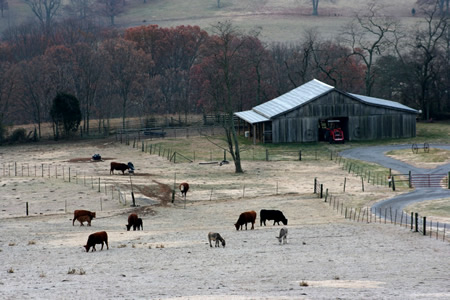Farmers Cool the Earth
One of my most vivid memories from last year’s UN climate conference at Cancún is a banner that said: “Farmers Cool the Earth.” It was strung up at an encampment organized by Via Campesina, a global network of small farmer and peasant organizations.
Later during a march through the streets of Cancún, I was approached by an organic farmer from Ontario who had spotted my green NFU cap – a gift from a National Farmers Union member whom I had accompanied on a solidarity mission to Central America. It turns out the organic farmer was representing the NFU at the Via Campesina camp. As we walked along he told me some very hopeful stories about what family farmers are already doing in Canada to cool the planet by farming sustainably.
Far from being an empty slogan, scientific studies bear out this claim. Whereas large-scale industrial agriculture depletes organic matter from the soil, spewing carbon dioxide into the air, small-scale sustainable farming could capture 30-40% of excess CO2 from the atmosphere while rebuilding soil fertility. Integrating animal husbandry with crop production instead of concentrating livestock on large factory farms could reduce global emissions by another 5-9%. If most food were sold through local markets instead of trucked over long distances, not only would it be more nutritious, but another 10-12% of global emissions could be eliminated. By eliminating land clearing and deforestation to make way for monoculture plantations, an additional 15-18% of global emissions would be avoided.
Then as I sat down to write this my first blog prior to the Durban climate conference, I opened a letter from another friend of KAIROS, Art Macklin, who is a former president of the NFU. Art’s letter tells a troubling story about what is happening to farmers in Canada and the implications for climate change.
Art describes the consequences of the federal government’s current legislation that would destroy the single-desk marketing function of the Canadian Wheat Board (CWB). Most of the media coverage has concentrated on the economic losses that smaller farmers would suffer if they are forced to deal as individuals with the powerful transnational grain companies. Some stories mention the fact that 62% of wheat growers voted in a plebiscite against the dismantling of the CWB.
However, Art brings out the hidden ecological cost. Many smaller wheat and barley growers are in fact mixed farmers who keep cattle or other animals as well. They farm with smaller equipment and keep trees, hedgerows and wetlands on their farms. If they are forced to sell out to larger operators, these trees are sure to be bulldozed and burnt to make way for bigger machines without concern for stewardship of the soil, air and water.
Art goes on to say that “most larger farm operators use no-till farming practices.” He cites a recent scientific study that found that “no-till farming puts 60% more nitrous oxide into the atmosphere than conventional tillage per unit of yield and that nitrous oxide ‘is a potent greenhouse gas with the ability to trap heat in the atmosphere 300 times greater than that of carbon dioxide.’” No wonder then that Alberta’s Climate Change Secretariat is considering ending payments to farmers for “offsetting” carbon emissions through no-till agriculture that supposedly kept carbon in the soil.
Another consequence of the demise of the CWB will be that more grain will be hauled by trucks that are several times less energy-efficient than railcars for transporting bulk cargoes. Clearly the struggle to preserve the wheat board involves more than making sure that all farmers get a fair price for the grain they grow. It is also an issue of climate justice.
As the seventeenth Conference of the Parties to the UN Framework Convention on Climate Change opens in Durban, South Africa, I will be keeping one eye on what the Canadian delegation does. Will Environment Minister Peter Kent still refuse to make an emission reduction commitment under the second phase of the Kyoto Protocol?
My other eye will remain fixed on Ottawa in the hope that all citizens who care about climate justice will join with farmers to prevent the passage of Bill C-18 to dismantle the CWB and instead make room for sustainable family farms to cool the Earth.









